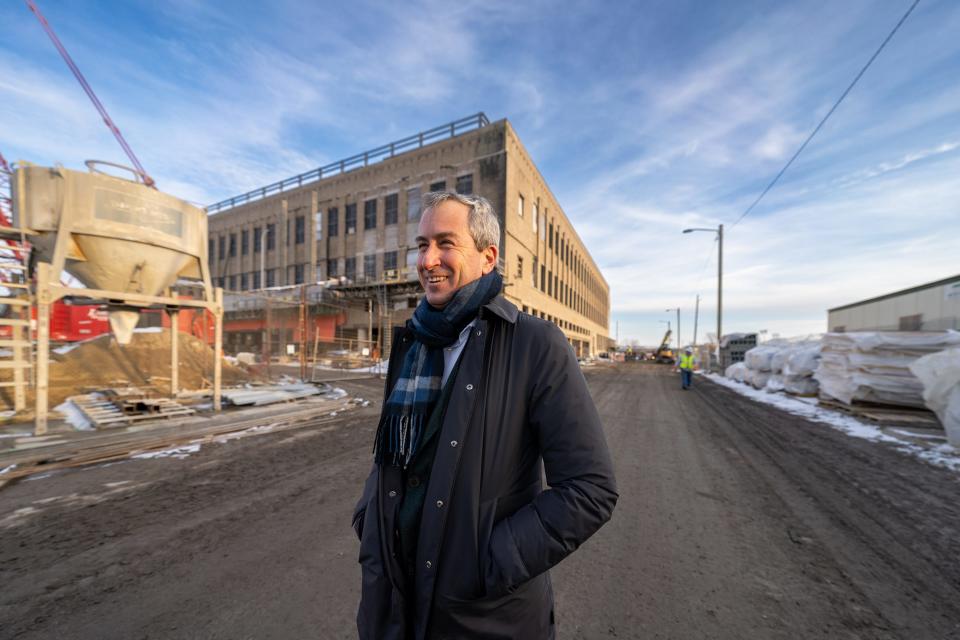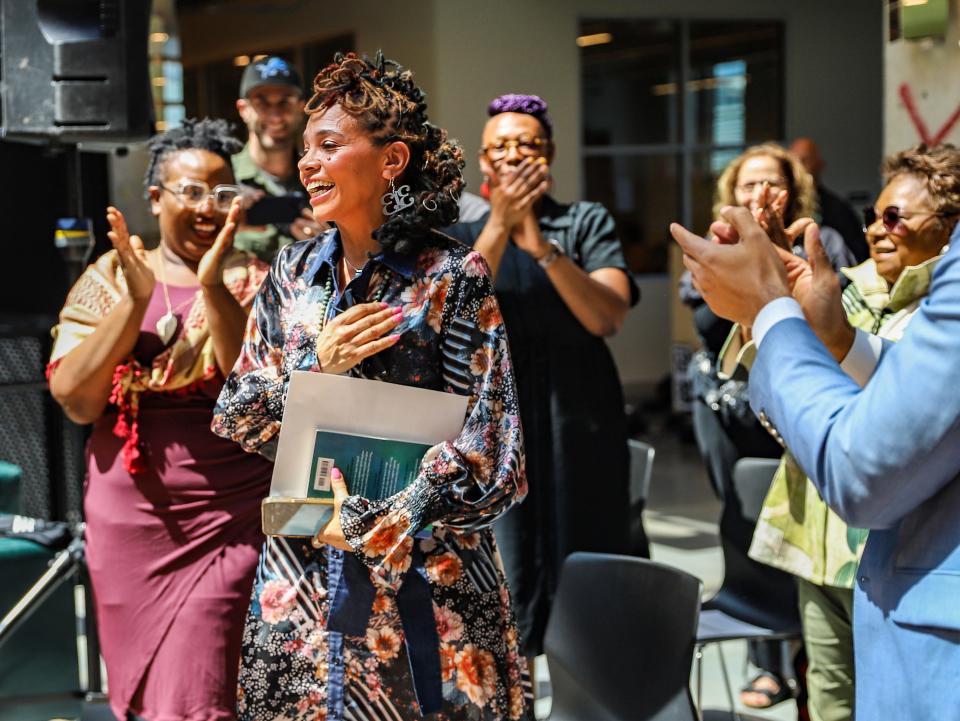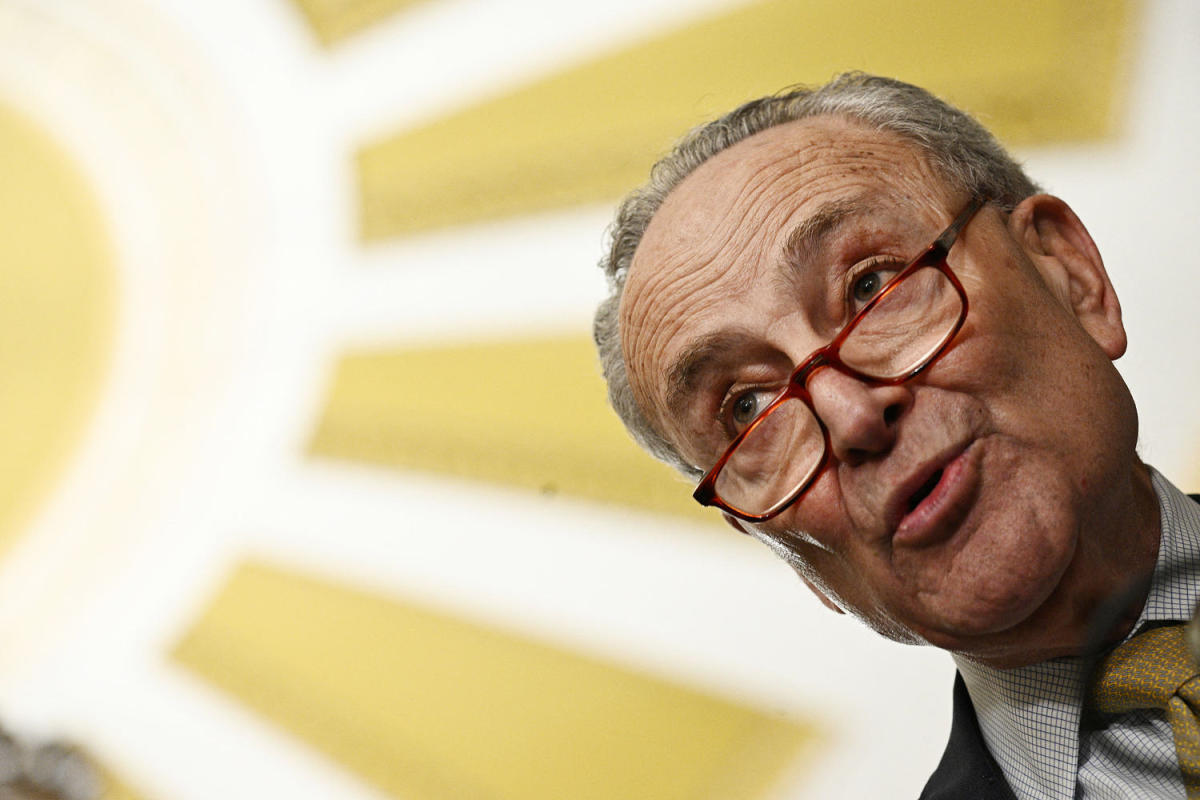Josh Sirefman returned to Detroit from New York City two years ago to run the massive Michigan Central campus in Corktown that Ford Motor Co. has transformed, and finds himself leading what he calls the only innovation center of its kind.
“The growth of Michigan Central as an anchor institution, as an epicenter …” Sirefman told the Detroit Free Press, is “pulling people together across all kinds of boundaries and ecosystems and aspects of the knowledge economy and vision and community. It’s pretty exciting.”
The old Detroit Public Schools Book Depository next door to the famed train station is now home to 97 companies with 600 or so employees unrelated to Ford, and includes design elements and amenities more commonly seen in Silicon Valley. For example, it has showers for use by the hundreds of non-Ford workers based at the site who may want to bicycle to work. The term “knowledge economy” refers to industries and careers based on being paid for activities such as invention rather than physical labor.
“We launched Newlab at Michigan Central in April 2023, and the growth since then has really been extraordinary. Not just the total number of companies we’ve got but watching those companies themselves start to grow,” Sirefman told the Detroit Free Press. “Just the growth in our innovation infrastructure. In some ways, it really has exceeded our expectations.”
At the same time, Bill Ford, who led the $950 million restoration of the 30-acre campus with the automaker’s purchase of multiple properties in the Corktown area in 2018, has focused on maintaining history and tradition. Despite the costly challenges, Bill Ford never wavered, said Detroit Mayor Mike Duggan.
“There is nowhere quite like this or doing what we’re doing at Michigan Central,” Sirefman said. “For companies from early stage through to institutions, universities, not-for-profits, civic organizations. The model here is where one company has created an opportunity for all kinds of entities to be participants in this innovation. That’s really powerful.”
Who is making this all happen behind the scenes?
Sirefman oversees what is a wholly-owned subsidiary of Ford Motor Co., a team that is estimated to be about 40 people now. It’s a group, he said, that works to drive the whole Michigan Central enterprise.
“We have members of the team who are really experienced in innovation and technology but also in entrepreneurial skills and activities required to build companies and businesses,” Sirefman said. “We have people who are focused on the physical environment, and that ranges from the details of interior work all the way to restoration of historic buildings to a much broader planning scale.
“We have folks focused entirely on how we leverage what’s happening at Michigan Central to ensure there’s opportunity to train Detroiters, build skills for growth and the knowledge economy and for us, obviously, with a particular focus on the jobs and opportunities around the future of mobility. We have a team dedicated to community engagement and working with our neighbors all around us but also the city and region.”

Sirefman, 56, sees an increase in walking and bicycling among people who work at the site. He lives in an apartment at Book Cadillac on Washington Boulevard and his commute by foot to Michigan Avenue is fast.
Michigan Central Station, opened in 1913 and designed by the same firms that did New York’s Grand Central Terminal, served Detroit during its glory days. For decades, it operated as a hub of Detroit life, the place where immigrants arrived in the city and where soldiers left for World War II. But America’s transportation network changed, and the 18-story station closed in 1988. Scavengers and vandals turned the site into a symbol of urban ruin and the decline of Detroit. Ambassador Bridge owner Manuel (Matty) Moroun bought the old train station out of tax foreclosure in 1995, leaving it vacant and largely exposed to the elements, vandals and urban explorers.
News reports cite various heights for Michigan Central Station, a Beaux Arts-style building.
“It’s confusing, we know,” said Dan Austin, communications director for Michigan Central. “There are 13 floors in the tower, but the station is 18 stories tall. The elevator goes up to 18. (floors) one through three are the depot part of the building.”
Focus is on the future, including children in Detroit
These days, Sirefman said, the site might be compared to Station F in Paris, France, which prides itself as the world’s largest startup campus with more than 1,000 early-stage companies and programs.
Michigan Central also includes educational programs for children, with extensive programs that have already catered to hundreds of metro Detroit children aimed at inspiring them to pursue interests in the knowledge economy .

Michigan Central Station has a partnership and collaboration with the city of Detroit and the state of Michigan to work with public and private entities piloting, testing and understanding the use of drones in the transportation industry, because the 30-acre innovation district sits in the middle of an urban area and includes an aerial zone for study, Sirefman said. Some companies based at Newlab are specifically focused on these issues.
“Low-altitude airspace” remains an area of being developed, he said. “There’s all kinds of things in place to control airplanes and high-altitude things, but as the use of drones expands, how do you manage that? We’ve done skills training around drones including youth — understanding what drones are and what they can do.”
From New York to the Motor City
Sirefman, an urban planner who trained at the University of Michigan and began his career in Detroit, went on to run New York City-based Sidewalk Labs. The company was founded in 2015 as Google’s arm for urban innovation, becoming an Alphabet company in 2016, according to its website.
“I have led transformative development projects for a range of corporate, nonprofit and government entities, including Cornell University’s successful effort to build a new applied sciences campus in New York City, the University of Chicago’s transformation of Hyde Park through the redevelopment of a vibrant new mixed-use district, and the repositioning of the New York Public Library’s renovation of its flagship building,” Sirefman said in his LinkedIn online professional profile.
What is being done in Corktown and southwest Detroit, overall, can be difficult to explain, Sirefman said. People who visit are “really blown away,” he said.
“I don’t think there is really a model out there that we can say we want to be like,” Sirefman said. “It’s a true honor and privilege to be a part of it.”
More: Ford changed Michigan Central Station design plans after southwest Detroiters spoke up
More: Ford reopened quarry to get exact limestone match for Michigan Central Station renovation
Contact Phoebe Wall Howard: 313-618-1034 or phoward@freepress.com. Follow her on X, formerly known as Twitter @phoebesaid. Read more on Ford and sign up for our autos newsletter.
This article originally appeared on Detroit Free Press: Michigan Central Station CEO: Campus has exceeded expectations already
Signup bonus from





